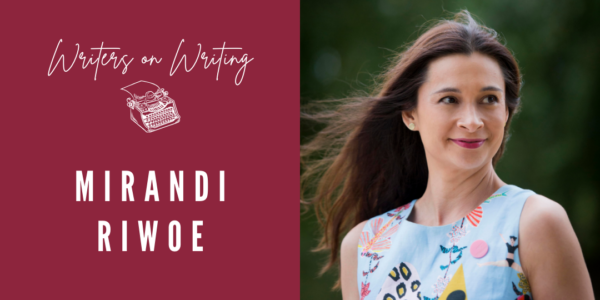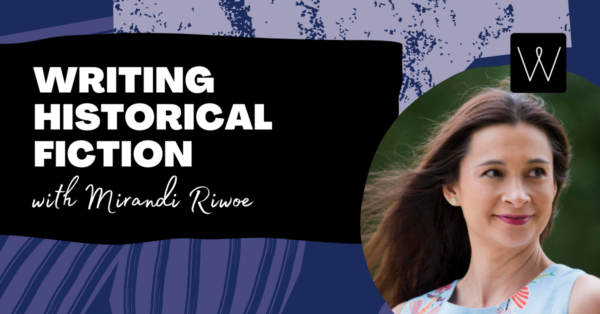
Writers on Writing is our regular conversation with a writer or industry professional about the writing craft, industry insights, and their own practice. We spoke to Mirandi Riwoe about the craft of writing historical fiction, ahead of her full-day workshop at Writing NSW on 22 June.
What is your favourite aspect of historical fiction?
There are so many things I love about writing and reading historical fiction. So much information, accurate and inaccurate, about the past, is buried away in historical texts that will probably never be revisited or analysed by most people. An historical novel can bring some of these important or interesting subjects to the fore for the modern reader in a manner that is more palatable than historical non-fiction – in that the information is presented in the shape of a story. I like to explore in what way some things have changed over time and in what way they have not changed sufficiently, especially within feminist or cultural contexts. I like to write back against false beliefs or generalisations depicted in existing fiction or historical texts, such as that of the ‘sinister Oriental’ or the ‘wanton’ woman and I love to write about those who have been ignored or not written about enough in the past, such as the working class or the culturally diverse.
A lot of research tends to go into writing historical fiction – do you ever get bogged down by the sheer amount of information? If so, how do you prevent yourself from being overwhelmed?
There are so many possible research sources to explore when starting out on an idea or novel. It can be very overwhelming, but exciting too. Research has given me characters and their stories and if the synopsis is the bones of my novel, research helps me put flesh on those bones. But you also have to know when to stop gathering information and how to resist dumping every fascinating thing you have learned into your story. The best rule of thumb is to only keep the information that serves your character or your story line. The rest you have to cull (or keep in a document for next time!).
The balance between ‘authenticity’ and ‘accuracy’ is a tough one. How do you make the decision between narrative priorities and accurate historical representation?
Of course, I want my books to be as accurate as possible, but I also want the reader to be engaged in the narrative. For example, an absolutely accurate portrayal of time-specific dialogue or language – let’s say, from the Elizabethan period – might be very heavy going for the contemporary reader. Readers want a world that feels accurate, that gives the impression of accuracy. I think the historical writer has to decide where, on the scale of accuracy versus authenticity, their work might sit. For example, when I watched The Tudors, I was entirely entertained, yet a quick internet search clarified how certain aspects of the series were only loosely (or not at all) accurate. Yet the series was authentic enough for me to remain engaged. I am probably more strict in my own parameters when writing a novel, though. I don’t like to fudge dates or setting and, when it comes to representations of actual people, I work within the gaps of knowledge, a process I first read about in Margaret Atwood’s ‘In Search of Alias Grace: on Writing Canadian Historical Fiction’.
Finally, is there anything you’ve read lately and enjoyed?
When I was in Ireland at a beautiful writers’ residency, Tyrone Guthrie Centre, each day I shrugged into my puffer jacket and pulled on a beanie and went for a brisk walk and listened to audiobooks. I have read Austen’s Persuasion before, and I adore the BBC adaptations, but I really enjoyed listening to the novel all over again. I also listened to Sarah Holland Batt read her Stella Prize-winning The Jaguar and Margaret Atwood’s Dearly. In the evenings I read all of Claire Keegan’s work. What truly sublime, thoughtful, touching writing.
Mirandi Riwoe is the author of Stone Sky Gold Mountain, which won the 2020 Queensland Literary Award – Fiction Book Award and the inaugural ARA Historical Novel Prize, and was shortlisted for the 2021 Stella Prize and longlisted for the 2021 Miles Franklin Literary Award, and the short story collection The Burnished Sun. Her work has appeared in Best Australian Stories, Meanjin, Review of Australian Fiction, Griffith Review and Best Summer Stories. Mirandi has a PhD in Creative Writing and Literary Studies and lives in Brisbane.
Join Mirandi’s workshop Writing Historical Fiction at Writing NSW on Saturday 22 June 2024, 10am-4pm

If you want to be the first to read great advice, prompts and inspiration from our incredible tutors, subscribe to our weekly e-newsletter Newsbite.
More from Writing NSW
Check out our full range of writing courses in Sydney, our online writing courses and our feedback programs to see how we can help you on your creative writing journey. Find out about our grants and prizes, as well as writing groups across NSW, and sign up to our weekly newsletter for writing events, opportunities and giveaways.
